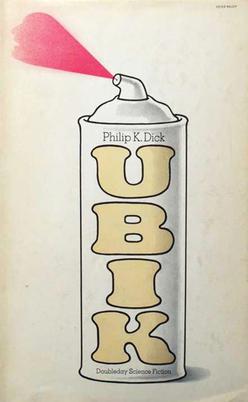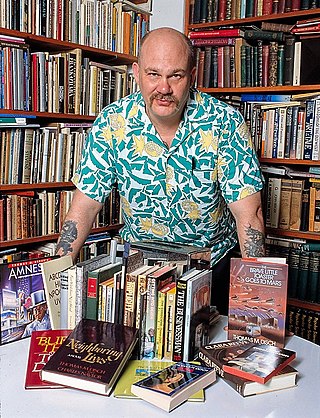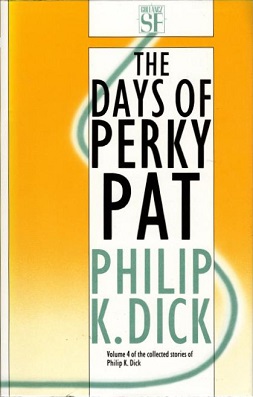Plot summary
The main character is Jesse Slade, a bored man living in 2040 who visits a time travel tourism agency for a vacation. The agency offers him a trip to the past where he can act as the muse for a famous artist of his choice. Slade chooses to inspire his favorite science fiction author of the 1960s, Jack Dowland, who is said to be universally acclaimed as the greatest of the three master science fiction authors of his time, the others being Isaac Asimov and Robert A. Heinlein.
Slade travels to Purpleblossom, Nevada, in 1956, where he is to inspire the writing of Dowland's masterpiece, The Father on the Wall. On his arrival, he has difficulty communicating, and is so unable to impress Dowland that he desperately discloses his identity as a time traveller. Dowland is so irritated at this that he becomes cynical about science fiction altogether, and never becomes the master that he might have been.

Philip Kindred Dick, often referred to by his initials PKD, was an American science fiction writer and novelist. He wrote 44 novels and about 121 short stories, most of which appeared in science fiction magazines during his lifetime. His fiction explored varied philosophical and social questions such as the nature of reality, perception, human nature, and identity, and commonly featured characters struggling against elements such as alternate realities, illusory environments, monopolistic corporations, drug abuse, authoritarian governments, and altered states of consciousness. He is considered one of the most important figures in 20th-century science fiction.

A Scanner Darkly is a science fiction novel by American writer Philip K. Dick, published in 1977. The semi-autobiographical story is set in a dystopian Orange County, California, in the then-future of June 1994, and includes an extensive portrayal of drug culture and drug use. The novel is one of Dick's best-known works and served as the basis for a 2006 film of the same name, directed by Richard Linklater.

Ubik is a 1969 science fiction novel by American writer Philip K. Dick. The story is set in a future 1992 where psychic powers are utilized in corporate espionage, while cryonic technology allows recently deceased people to be maintained in a lengthy state of hibernation. It follows Joe Chip, a technician at a psychic agency who begins to experience strange alterations in reality that can be temporarily reversed by a mysterious store-bought substance called Ubik. This work expands upon characters and concepts previously introduced in the vignette "What the Dead Men Say".

Timothy Thomas Powers is an American science fiction and fantasy author. His first major novel was The Drawing of the Dark (1979), but the novel that earned him wide praise was The Anubis Gates (1983), which won the Philip K. Dick Award, and has since been published in many other languages. His other written work include Dinner at Deviant's Palace (1985), Last Call (1992), Expiration Date (1996), Earthquake Weather (1997), Declare (2000), and Three Days to Never (2006). Powers has won the World Fantasy Award twice for his critically acclaimed novels Last Call and Declare. His 1987 novel On Stranger Tides served as inspiration for the Monkey Island franchise of video games and was partly adapted into the fourth Pirates of the Caribbean film.

The Man in the High Castle is an alternative history novel by Philip K. Dick, first published in 1962, which imagines a world in which the Axis Powers won World War II. The story occurs in 1962, fifteen years after the end of the war in 1947, and depicts the life of several characters living under Imperial Japan or Nazi Germany as they rule a partitioned United States. The eponymous character is the mysterious author of a novel-within-the-novel entitled The Grasshopper Lies Heavy, a subversive alternative history of the war in which the Allied Powers are victorious.
"We Can Remember It for You Wholesale" is a science fiction novelette by American writer Philip K. Dick, first published in The Magazine of Fantasy & Science Fiction in April 1966. It features a melding of reality, false memory, and real memory. The story was adapted into the 1990 film Total Recall with Arnold Schwarzenegger as the story's protagonist; that film was remade in 2012 with Colin Farrell as the protagonist.

Thomas Michael Disch was an American science fiction writer and poet. He won the Hugo Award for Best Related Book —previously called "Best Non-Fiction Book" —in 1999. He had two other Hugo nominations and nine Nebula Award nominations to his credit, plus one win of the John W. Campbell Memorial Award, a Rhysling Award, and two Seiun Awards, among others.

Robert Charles Wilson is an American-Canadian science fiction author.
"The Variable Man" is a science fiction novella by American writer Philip K. Dick, which he wrote and sold before he had an agent. It was first published in the British magazine Space Science Fiction Vol. 2 No. 2, July 1953, and in the American version in September 1953, with the US publication illustrated by Alex Ebel. Despite the magazine cover dates it is unclear whether the first publication was in the UK or in the United States where magazines tended to be published farther ahead of their cover dates than in the UK. The Variable Man can be found in several collections of Dick's short stories, including The Variable Man and The Short Happy Life of the Brown Oxford.
Walter Braden "Jack" Finney was an American writer. His best-known works are science fiction and thrillers, including The Body Snatchers and Time and Again. The former was the basis for the 1956 film Invasion of the Body Snatchers and its remakes.

Bruce Bethke is an American author best known for his 1983 short story "Cyberpunk" which led to the widespread use of the term for the cyberpunk subgenre of science fiction. His novel, Headcrash, won the Philip K. Dick Award in 1995 for SF original paperback published in the US.
Michael Lawson Bishop was an American author. Over five decades and in more than thirty books, he created what has been called a "body of work that stands among the most admired and influential in modern science fiction and fantasy literature."

Terrance William Dicks was an English author and television screenwriter, script editor and producer. In television, he had a long association with the BBC science-fiction series Doctor Who, working as a writer and also serving as the programme's script editor from 1968 to 1974. The Doctor Who News Page described him as "arguably the most prolific contributor to Doctor Who". He later became a script editor and producer of classic serials for the BBC.
"The Last of the Masters" is a science fiction novelette by American writer Philip K. Dick. The original manuscript of the story was received by the Scott Meredith Literary Agency on July 15, 1953, and the story was published by the Hanro Corporation in the final issue of Orbit Science Fiction in 1954. It has since been reprinted in several Philip K. Dick story collections, beginning with The Golden Man in 1980.

Our Friends from Frolix 8 is a 1970 science fiction novel by American writer Philip K. Dick. It was written from 1968-69 and was published the next year by Ace Books. The novel is set in the 22nd century, where humanity is ruled by mutated humans, "New Men" and "Unusuals", while normal "Old Men" are discriminated against. The story follows Nick Appleton, a low-class worker who falls in love with a subversive agent, while a man named Thors Provoni has gone deep into space to find an ally to the resistance, the eponymous friend from Frolix 8. It is best known for a single scene where the characters discuss the dead body of God having been found in space.

The bibliography of Philip K. Dick includes 44 novels, 121 short stories, and 14 short story collections published by American science fiction author Philip K. Dick during his lifetime.

The Collected Stories of Philip K. Dick is a collection of 118 science fiction stories by American writer Philip K. Dick. It was first published by Underwood-Miller in 1987 as a five volume set. See Philip K. Dick bibliography for information about the mass market reprints.

The Days of Perky Pat is a collection of science fiction stories by American writer Philip K. Dick. It was first published by Gollancz in 1990 and reprints Volume IV of The Collected Stories of Philip K. Dick. It had not previously been published as a stand-alone volume. The stories had originally appeared in the magazines Galaxy Science Fiction, Science Fiction Stories, If, Fantastic Universe, Fantasy and Science Fiction, Fantastic, Worlds of Tomorrow, Escapade and Amazing Stories.

The Minority Report is a re-titled collection of science fiction stories by Philip K. Dick. It was published by Gollancz and Citadel Twilight in 1991, being a reprint of Volume IV, "The Days of Perky Pat" of The Collected Stories of Philip K. Dick (1987). The collection The Days of Perky Pat was published in Britain in hardback by Gollancz in 1990 and in paperback by Grafton in 1991. The stories had originally appeared in the magazines Galaxy Science Fiction, Science Fiction Stories, If, Fantastic Universe, Fantasy and Science Fiction, Fantastic, Worlds of Tomorrow, Escapade and Amazing Stories.
"Meddler" is a science fiction short story by American writer Philip K. Dick. It was first published in Future Science Fiction, October 1954 with illustration by Virgil Finlay. Dick had submitted many short stories to magazines and made approximately fifteen sales before becoming a client of the Scott Meredith Literary Agency. This was his second SMLA submission, received by SMLA on July 24, 1952. His first SMLA submission was The Builder, received by SMLA on July 23, 1952.













